- PSD to WordPress
-

- Learn
-

- Expert roundups
-

- The best RSS Reader / Aggregator
The best RSS Reader / Aggregator
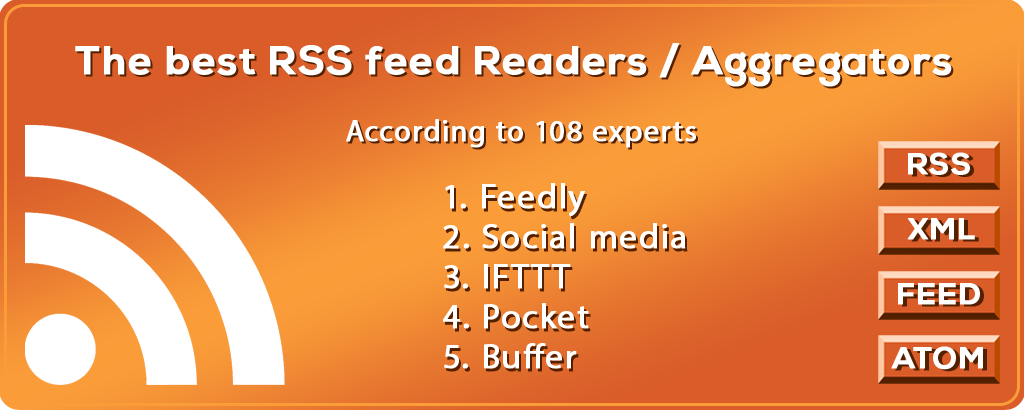
How many websites do you visit every day? A lot of people visit over ten websites every day, because those websites publish new articles on a daily base and they don’t want to miss anything.
You’ll probably agree with me when I say that it can become very annoying if you have to visit all those websites day after day to make sure you don’t miss anything, right?
At first, staying up to date with your favorite websites was to subscribe to the newsletter. A lot of people still use email subscriptions for staying up to date, but there also were (and are) a lot of people who found such subscriptions unclear or were annoyed because those emails end up in the SPAM folder a lot. To satisfy the ones who didn’t like email subscription, RSS is by far the best alternative.
What is a RSS feed?
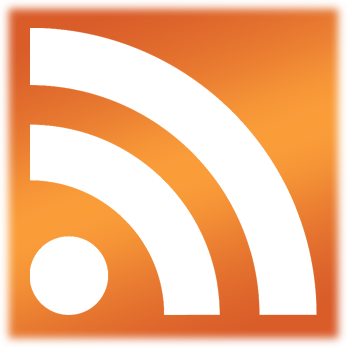 Really Simple Syndication, abbreviated RSS, is a simple way for websites to make new content available in the form of a list: a RSS feed. RSS feeds are built using XML which isn’t really user-friendly to use. To make RSS feeds user-friendly to use, you need to use an RSS feed reader, also known as a news aggregator.
Really Simple Syndication, abbreviated RSS, is a simple way for websites to make new content available in the form of a list: a RSS feed. RSS feeds are built using XML which isn’t really user-friendly to use. To make RSS feeds user-friendly to use, you need to use an RSS feed reader, also known as a news aggregator.
What is a RSS reader or aggregator?
A RSS reader/aggregator is a type of tool which allows the user to import multiple RSS feeds from all their favorite websites. Depending on the tool, this can be done through desktop software, a web service, a mobile app or a browser extension. The RSS reader/aggregator displays new content from your favorite websites in an organized and clear way. You won’t have to visit all those websites anymore, and still see all new articles as soon as you refresh your RSS feed reader.
How to find and use RSS feeds in a RSS reader
Nowadays most websites with changing contents offer a RSS feed. This usually is an orange icon containing the text ‘RSS’ or ‘XML’, or just via an normal text link linking to the RSS feed. Import the RSS feed URL in your RSS feed reader/aggregator. Once you’ve imported the RSS feeds of your choice in your RSS reader, all you have to do is open the RSS feed reader and all new articles will be displayed.
The best RSS reader-aggregator
There are many ways on how you can read RSS feeds, and everyone has his own motivation for using a particular aggregator. This results in a wide range of RSS feed readers and news aggregators. To find out what the best RSS reader/aggregator is, and why it is the best, we’ve asked 108 experts the following question:
Which tool(s) do you use to read RSS feeds from your favorite blogs?
The best RSS reader/aggregator
Based on the insights of 108 designers
- Feedly 39% votes
- Social Media 12% votes
- IFTTT 7% votes
- Pocket 6% votes
- Buffer 4% votes Show all results..
- Bloglovin'
- Blogtrottr
- Capti
- CommaFeed
- Digg Reader
- Email subscription
- Evernote
- FeedBin
- Feedbro Reader
- FeedDemon
- Flow Reader
- G2Reader
- Hootsuite
- Instapaper
- Pulse
- Outlook
- Mr. Reader
- NewsFire
- Newsle
- Nuzzel
- Palabre
- Paper.li
- Prismatic
- Readability
- Readkit
- Reeder
- Scoop.it
- Slack
- Solve for all
- Triberr
- TweetDeck
- Unread
- Zite Hide..
From this point, all results have less than 4% of the votes and are ordered alphabetically
Conclusion
Feedly is by far the most popular RSS reader-aggregator. Feedly is dominating the aggregator market which isn’t only because it’s very easy to use. What a lot of experts like about Feedly is that you can easily integrate other services like IFTTT or Pocket, or both (which explains their top 5 positions). Noteworthy is the uprising of following websites via social media platforms like Twitter Lists and Facebook influencers, instead of using an RSS feed reader / aggregator.
108 Experts
Quickly find all 108 alphabetically ordered experts and their insights.
- A:
- B:
- C:
- D:
- E:
- F:
- G:
- H:
- I:
- J:
- K:
- L:
- M:
- N:
- P:
- R:
- S:
- T:
- V:
- W:
- Z:
All 108 experts and their insights
All expert reactions are chronologically ordered
Marcus Miller
Website
I have always been a fan of RSS feeds. It feels like they are somewhat out of fashion or is a technology that never quite made it but for me they have always allowed me to centralise all of the my reading duties into one single stream. Over the years I have used various readers from Outlook Express to Thunderbird to more modern web services like the now discontinued Google Reader and Feedburner.
I played with a few alternatives but have settled on Feedly. I follow so many SEO, PPC, Social & digital marketing blogs and RSS is still the best way for me to stay on top of everything in once place. I have a Feedly plugin in my web browser that has a cute icon with all the posts I have to review (81 at present), I have Feedly in my phone, I have Feedly on my tablet and I can get it on any web enabled laptop or device.
I have categorised the content and integrated it with Google alerts and we are currently looking at working Evernote and Slack into our organisation and I know Feedly integrates with these platforms. Feedly feeds me the information I need to review and stay on top of in a way that suits how I work so it would certainly be my recommendation for a modern, friendly, flexible RSS platform.
Kristi Hines
Kristi Hines
I use Feedly for my RSS feeds. I love it for a variety of reasons.
- I can use it on my desktop and on my iPhone;
- I can easily find blogs I want to subscribe to using their search box;
- I have an integration with IFTTT (through Feedly Pro) to take any posts I save for later and add them to my Buffer, which makes content curation much simpler.
Bas van den Beld
Website
I use several tools in which I use the function of RSS.
There are the tools I use for keeping up-to-date with what is current, like Feedly and GetPrismatic of course.
Then there are tools I use to monitor what specific audiences are saying on specific topics. For example I use Google spreadsheets to get feeds in from social platforms like Quora, Twitter and Linkedin, which tell me what people are talking about.
A tool that does that to a certain extend is ozcontent.com.
The third way of using RSS feeds is to monitor social mentions & shares. There are tools (like Buzzsumo) who do that, but I also like to play with the data and better compare different social channels and updates. Using RSS I can do that.
Kelsey Jones
Website
I love BlogLovin' desktop and especially the app-- since the interface is black and white, it's really easy to read and they also give you recommendations on different blogs to follow after you subscribe to a new one. I also really like that you can separate your blogs into separate categories. So if I want to read about Marketing, then I can just go to that category, instead of my Marketing blogs bleeding in with my fitness and healthy living blogs. :)
Neil Patel
Website
I stopped using RSS years ago. I now just use Gmail. I subscribe to blogs using my email address... which happens to be a Gmail one. I then create filters within Gmail to place all of the blogs I subscribe to in a specific folder so that way my inbox isn't being flooded.
Louis Gray
WebsiteLee Beirne
WebsiteSarah Lively
Website
My go-to tool for reading RSS feeds is a combination of Pocket, IFTTT and Capti. These three tools work in tandem to create an easy, effective way to always have the latest content from your favorite publications at your fingertips. Best off all, each tool is free and making them work together is free as well.
Pocket is a great tool for storing content you want to read later. It connects with your browser so you can save content as you find it, and it syncs with all of your devices so articles are ready to read wherever you are. At it’s core, Pocket is more of a bookmarking tool than a reader, but what most people don't know is that with a simple IFTTT recipe Pocket can transform into your favorite place to read an RSS feed.
IFTTT is a genius platform that basically connects all of your channels in a way that’s meaningful to you. You can have your phone text you if it’s going to rain tomorrow, RT tweets from your favorite influencer, or, one of my personal favorites, push RSS feeds to Pocket.
IFTTT comes ready with recipes to connect Feed to Pocket, making it simple to get started. Simply add the Feed URL and relevant tags to stay organized, and you’re ready to go.
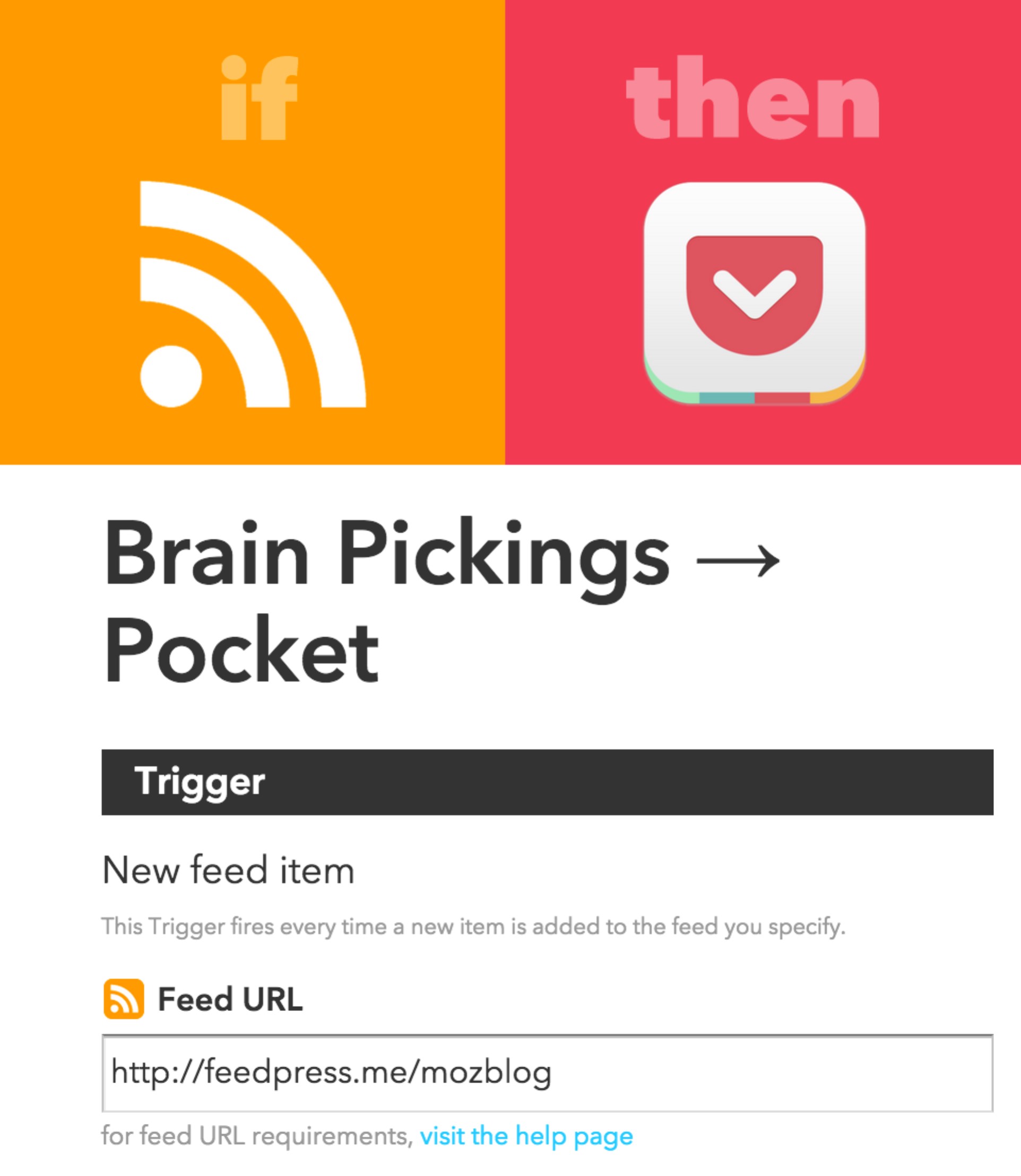
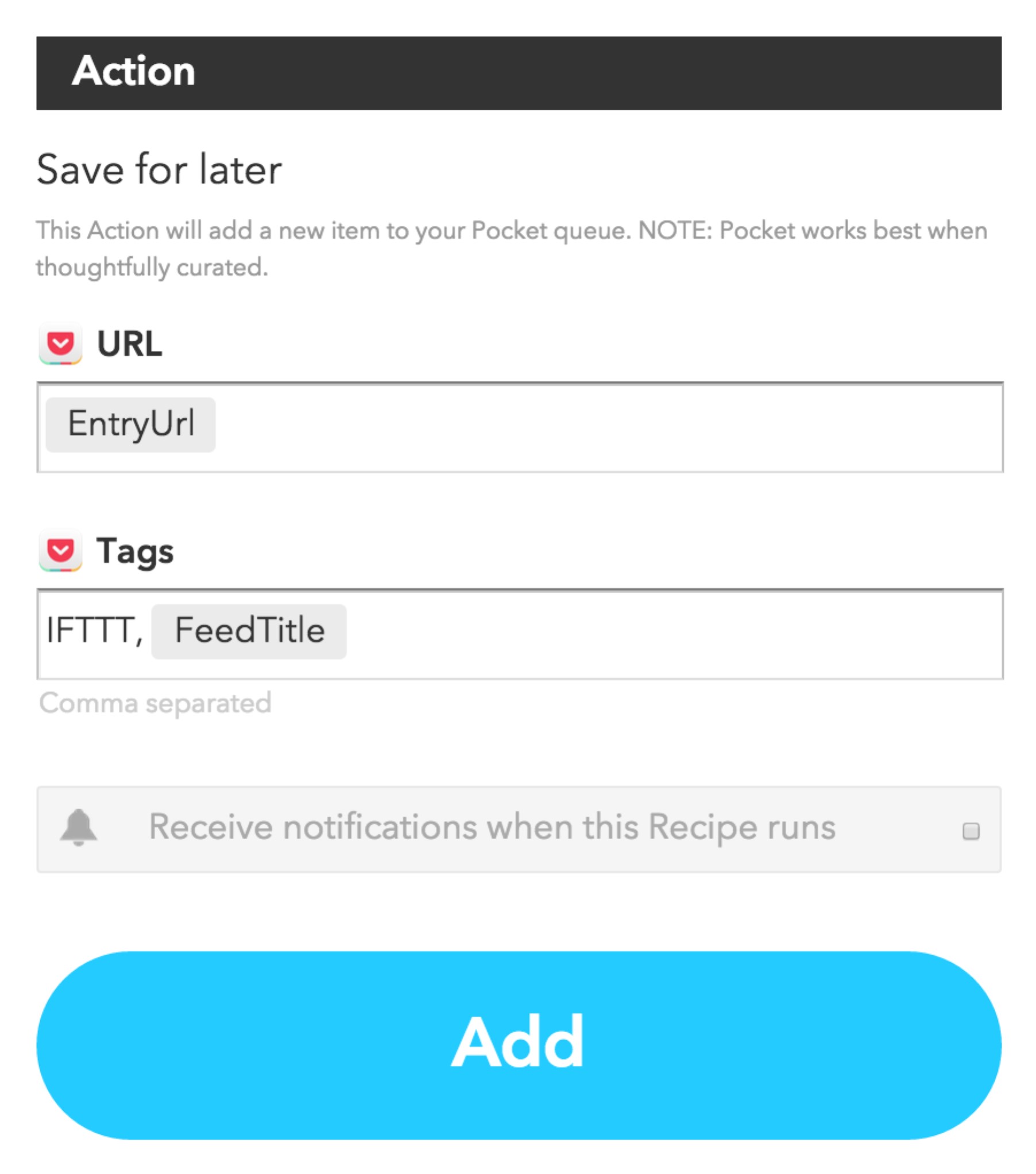
With Pocket, you’ll be able to have your favorite RSS feeds and articles you’ve saved around the web all in one place, across all of your devices. That’s great, but if you’re like me you don’t enough time to read all of this content you’re constantly adding to a feed. This is where Capti comes in.
Capti is a free voice reader app that integrates with Pocket so you can listen to all of the articles from your RSS feed. The voice is a little robotic, but not as bad as one might think. Now working out, commuting, or just going for a walk can be an easy time to catch up on all of the content sitting in Pocket. With Capti, IFTTT and Pocket all working together you can create an easy way to read or listen to all of your favorite feeds across any of our devices.
Eduard de Boer
Website
I'm subscribed to little over 100 RSS-feeds in order to stay up-to-date on what's happening in all areas, which have my interest. I prefer RSS above Twitter as a source for news. On the other hand, I also notice, I acquire more and more news on Google+ through my participation in various Google+ communities as well as from following various people and companies on Google+. At present, I get about 20-30% from my news from Google+.
My winning RSS-reader by-far is Feedly.com. I use it both on the desktop, as well as on my iPhone. Even sometimes when waiting in line in the supermarket, I often scan RSS-feeds and items on the iPhone. The biggest advantage to me is that I stay perfectly in-sync with my desktop, once I proceed with consuming the news from a larger screen. At the desktop, I also like to use the various hotkeys to quickly scan the headers.
I hardly read whole articles in Feedly. When I spot an article I might find interesting, I save the link in Pocket, where I immediately tag it. At a later moment I scan or read the articles, to see whether they are of any use e.g. in a blog post or a podcast. If not, I either delete, or archive the link.
Matthew Barby
Website
My favourite RSS reader is Feedly. I'm a big fan of the mobile app that they have and checking it has become part of my morning routine for some time now.
One of the other reasons for using Feedly outside of its good interface is the ability to link it up to IFTTT. I use an IFTTT recipe so that whenever I mark an article on Feedly as 'Saved for later' it sends the blog title and URL to my Buffer and schedules it in to be tweeted out from my account. This saves me a ton of time and is a great way to schedule on the fly.
Adam Connell
Website
My go-to RSS feed reader is Feedly.
I've used a bunch of others but there are a few reasons why I stick with Feedly:
- It's simple, easy to use and made it easy to life-raft my feeds from Google Reader;
- It integrates directly into Sprout Social so it makes finding content to share really easy;
- There's a mobile app so I can read feeds on the go;
- It's easy to find collections of feeds from other users - this is a great way to find new blogs.
Chris Makara
Website
For reading/managing RSS feeds, I was a long time user of Google Reader...however, made the jump to Feedly once Google Reader was being discontinued.
I can't remember the other options I explored, but I remember being able to easily import my Google Reader feed into Feedly. This feature ultimately saved me hours of unnecessary work when making the change.
Aside from being able to import, I like the ability to easily group my RSS feeds which helps me separate by topics. This makes it easy to isolate content that I am interested in reading.
Marko Saric
Website
I use Feedly on laptop since Google Reader got shut. On android I use Palabre for RSS as it has push notifications which are helpful. I don't follow too many blogs through RSS these days actually, most of the writers / bloggers / influencers that I like to hear from I follow on Twitter and I use Nuzzel to help me curate it all.
Jamie Knop
Website
My go to RSS feeder is Feedly. After Google Reader was discontinued I tested a few different services out but found Feedly to be the one for me. It's got a sweet user interface and lets me organize my different feeds into different categories. The service also has a few views of how you can view your feeds, one being a magazine style which pulls in an image from the article which I like rather than having a massive list of text. If I'm keeping a close eye on a certain blog then I will hook it up to Blogtrottr instead which will send me an email as soon as someone publishes a new post.
Josh Coffy
Flight Media
RSS feeds have changed my life. In fact, I attribute much of where I currently am to having a kick-ass system for reading content on a daily basis.
While most people have a basic RSS feed tool, like Feedly (which I use and love,) I enhance the process by adding email subscriptions to highly relevant business blogs and Evernote.
Here's my process:
- Scour Feedly weekly for relevant content;
- Review email subscription content weekly;
- Skim the article, save & tag for future blog posts with Clip to Evernote
This allows me to not only curate the best content out there, but it helps me save it for application later. Adding it to Evernote helps me draw back on the content, as well as for use in future, similar blog posts.
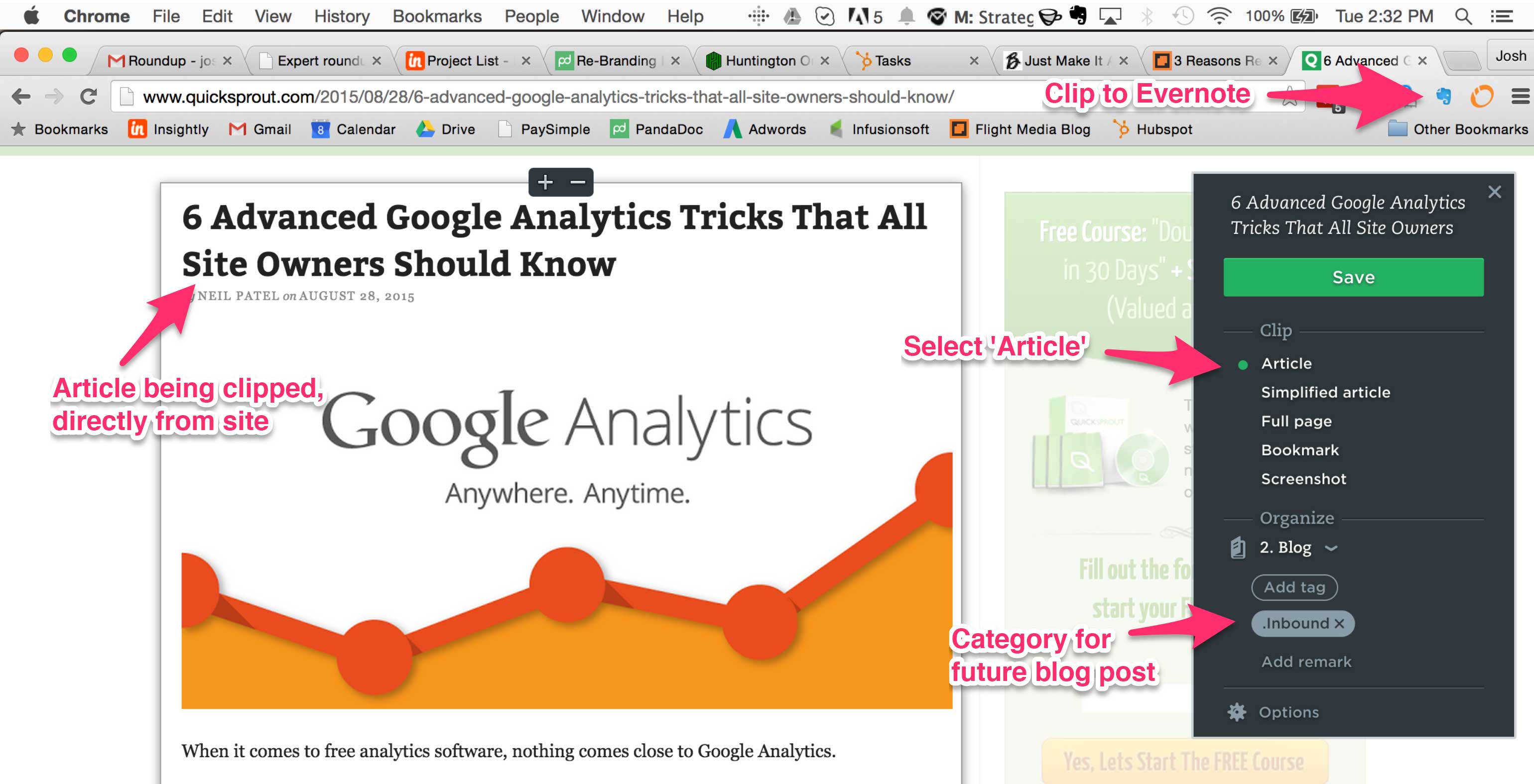
Zac Johnson
Website
When it comes to reading blogs and getting updates, I simply navigate to my favorite sites and see what's new. I was never big on actively reading RSS feeds. However, I am a big fan of affiliate news feed sites, which provide active updates on top blogs in the industry. These sites are great because they allow me to get a wide range of content, while also being able to sort through what posts are most recent and relevant to what I'm looking for. Another similar site to this concept is alltop.com.
Ian Cleary
Website
I used Feedly for tracking all of my RSS feeds. It has some great functionality, works great on mobile and provides great sharing capability.
Martin Woods
WebsiteChris Gilchrist
Website
I use Feedly as it works across devices and allows categorization of feeds, various views including list only which is great for skimming (essential for large volume intake quickly) or card/magazine for a better experience of the content. There's direct sharing across various platforms and you can login via various platforms which is useful if using for various projects ie jump between your gmail accounts to monitor different niches.
Matt Banner
Website
If you were like so many others when Google announced it was going to shut down the Google Reader RSS feed, then I have some great news for you.
After countless attempts to find a viable alternative for my RSS feed, I came across G2Reader, and my problems were solved. This is my tool of choice for several reasons:
- Supports OPML uploads;
- Compatibility with Google Alerts;
- Category folders similar to Google Reader;
- The ability to target and highlight specific keywords;
- Multiple languages available;
- Sharing features included;
- Android app available;
- Best of all, it's FREE!
There are plenty of good RSS feed tools out there, but none of them combine all of these amazing features into one program. With this tool, you'll have no problems keeping up with your favorite blogs. You'll never miss an update from On Blast Blog again!
Freddie Chatt
Website
Feedly is my go to RSS feed aggregator. It's great for my own personal reading of blogs I enjoy, keeping up to date with the latest industry trends, as well as for each client when looking for content to curate. The categories feature allows you to segment so you only see what you want to and the mobile app lets you do it wherever you are in the world.
Ashley Faulkes
Website
My favorite reader, since the departure of Google's is Feedly.
It is probably one of the most popular but I have many reasons why I still use it. Firstly it is easy to find, organise and read my favorite blogs via this reader. That is the main thing. But I am sure it is not everything for everyone.
Of course, if you want to take it even one step further and connect it with IFTTT (a logical tool that connects many applications with rules) then you also have something very powerful.
Tung Tran
Website
I only use Feedly for a few reasons:
- Free
- In the cloud - which means it will be automatically updated every time there's a new blog post.
- Distraction-free reading environment
Wade McMaster
Website
I actually don't really use them that much, but when I do I just include them in Microsoft Outlook. Not sexy or exciting, just boring old Outlook lol. That way I can check it at the same time as my email from my office.
Sue Anne Dunlevie
Website
I like to use Feedly - it's the single place to organize and read my favorite blogs all at once. I like it because it shows the posts I haven't read yet on each individual blog.
When I'm just browsing the web, I save my favorite blog posts to Pocket. When you find something you want to read later on, you can put the post or page into Pocket. It even syncs with all your devices. I like it because it is a Chrome extension. It's so easy to use and I can add tags to organize the posts.
David Leonhardt
Website
I’m a little unconventional when it comes to RSS feeds. First, almost every evening, I check into Triberr. The tribes I belong to use RSS feeds to bring forward the latest posts of the member blogs. I love this because the posts are all easy to share on Twitter with one click, or easy to open to comment on or share elsewhere, plus I can make a quick comment right on Triberr.
This does not cover all the blogs I want to follow, so I actually have a small batch file that automatically opens up certain blogs, each in a separate window. The syntax for this is:
@echo off
sleep 1
start "name1" "http://name1.com"
sleep 1
start "name2" “http://www.name2.com”
etc.
This is the ultimate DIY RSS feed. I like it because with one click I can open multiple blogs, and by the time I return to my desk with a slice of cheesecake
David Meerman Scott
Website
Previously I used Google Reader but since that service was discontinued, I now use NewsFire. I actually like NewsFire better so the demise of Google Reader is a good thing for me!
Brian Patterson
Website
I was a diehard Google Reader user, so like many people I was pretty annoyed and disoriented when they shut that product down. Fortunately a lot of RSS readers popped up to mimic the design of Reader, which was pretty intuitive. I tinkered with a bunch but finally settled on G2 Reader. It functions pretty much like Google Reader, which is to say it sorts by newest posts (by default), and you can dive into any specific feed to look at the latest from just that outlet.
That said, I feel like RSS was a lot more important before brands (both personal and companies) took over social media. Now I usually follow any person or company I'm interested in on social media as well, so I get their content on Facebook, Twitter, Instagram, etc. It has made RSS a little more expendable and less of something I have to check religiously throughout the day.
Sujan Patel
Website
I use feedly for iOS. I like it because it has a clean interface and it's easy to share content I like.
Dave Schneider
Website
I use Feedly. I think the functionality here is very simple. I am just looking for an RSS reader that I can go to on the web, when I am at my computer, and see the latest posts of blogs I follow. That one works just fine for me!
Ashley Faulkes
Website
My favorite reader, since the departure of Google's is Feedly.
It is probably one of the most popular but I have many reasons why I still use it. Firstly it is easy to find, organise and read my favorite blogs via this reader. That is the main thing. But I am sure it is not everything for everyone.
The other main feature that keeps me in feedly is the ability to share, specifically via Buffer. This is the key to my social sharing schedule and having access to Buffer is a must for any feed reader for me.
Of course, if you want to take it even one step further and connect it with IFTTT (a logical tool that connects many applications with rules) then you also have something very powerful.
Andy Beal
Website
I use Feedly.com. They stepped up to the plate when Google Reader announced it was shutting down. I have used them ever since.
Jeff Ferguson
WebsitePaul May
Website
I use Feedly.com as my reader, primarily because of the interface. We're also starting to play with their shared collections, which allows us to share the top blogs among everyone on the team.
Pedro Dias
Website
Since the demise of Google Reader, which was my reader of choice for 7 years, I struggled to find something clean and clutter-free. As a result, I tried almost all the feed readers that starting popping up; I experimented with Feedly, Digg Reader, NewsBlur, you name it. That went on until I stumbled on FeedBin, which I loved from the 1st moment I signed up.
Things that made me stick to it:
- Clean, uncluttered and distraction-free layout;
- Highly readable font;
- Integrated with social and almost anything you want to push feeds to (Pocket, Instapaper, etc);
- Great integration with most popular Desktop and Mobile feed readers, like Reeder for Mac and Press for Android;
- Also the option to import and, most importantly, export my feeds. I didn't want to choose something that would lock me in.
Sean Si
Website
I don't really use an RSS per se. Rather, I use an app called Flipboard - which has its own curation team. I like curated posts that are relevant to what I love to read - which is tech, software and SEO.
Flipboard does all the dirty work of curating for me and gives me what I need in a beautiful fashion right on my mobile phone.
Other curated lists I follow is Hiten Shah's SaaS weekly, Moz top 10, Groove Blog and Growth Hacks.
Tamar Weinberg
Website
Right now, I'm using Feedly.com - it's friendly and it has the functionality I need. But I want to give a shoutout to Digg Reader as it was my first choice after Google Reader shut down, and Shivram Subramanian of Digg was incredibly helpful in making sure a feed I had that Feedly couldn't process work in Digg Reader. When Digg Reader had a tech glitch with the same feed, I switched back to Feedly and that RSS feed started working again. At the time, Digg Reader hadn't had a mobile app, making the Feedly decision more sticky. Now, Digg has a great RSS reader on mobile too. Both of them are great choices and I would wholeheartedly recommend either.
Chris Dreyer
Website
Attorney Rankings utilizes a combination of Scoop.it and Feedly.com to stay in the "know" about current Internet marketing news. This was a tactic I picked up from Neil Ferree of FerreeMoney who specializes in social media marketing. Using Feedly you can sync your favorite RSS feeds directly into Scoop.it so that you have a wide range of topics you can curate on Scoop.it to utilize for your own social media efforts. It's been a very strong tactic. In fact, the tactic worked so well that I initiated a continuing education program for all of our employees where they have to read, summarize and share on social one article per day about Internet marketing. This allows the employee to guide their own learning and growth in the company. It gives them flexibility to pursue where they are weak and where they can improve.
Nate Shivar
Website
I use Feedly to pull in read RSS feeds. I love Feedly mainly because it's both a web and mobile app, so all my reading stays synced across devices.
Feedly also integrates well with a range of applications like IFTTT so I can automate a lot of a lot of otherwise tedious re-posting.
One pro-tip for Feedly is to learn the keyboard shortcuts - you can save tons of time when you're trying to curate hundreds or thousands of pieces.
Nick Loper
Website
Feedly. I know, not very exciting, but works well on desktop and mobile, and allows me to quickly catch up on my favorite sites and add relevant articles into my social sharing queue.
Kevin Raposo
Website
Keeping up with all your favorite blogs can be challenging without a proper RSS reader. A while back, I used to heavily rely on Digg Reader. It was great, it did its job. However, someone introduced me to Feedly and ever since then, I've been using that regularly. Feedly is my "go to" reader now because it's really simple to use. It provides a really clean experience along with some added functionality. They even have a premium option too, which honestly, I haven't tried yet. The free version is good enough for me. At the end of the day, you just want something that's simple and organized.
Tom Demers
Website
I love Feedly for reading various RSS feeds. I was a big Google Reader fan previously, and when that shut down I looked at alternatives and felt like Feedly basically offered the same functionality. The mobile experience is nice as well, so I've stuck with that for the past few years. It also integrates nicely with things like saving to Instapaper (if there's a longer read I don't want to finish in that sitting) and Emailing to myself / sharing on Twitter. Those three tools (Twitter, Instapaper and Feedly) are the three I use most for content consumption, with a basic mix of:
- Twitter for discovery of new content from places I don't follow (by seeing what smart folks share);
- Feedly to keep track of everything new on blogs I like
- Instapaper to save any longer / interesting reads I find on Twitter or in Feedly I don't have time to go through in that moment.
Then full circle back to Twitter to share good stuff :).
Ian Lurie
Website
I use Readkit for OS X. I miss Google Reader, and Readkit is the closest I can seem to find.
I combine that with IFTTT, Pocket and Feedly. IFTTT moves links I tweet to Pocket. Then my Feedly subscriptions and Pocket saves end up showing up in Readkit as an aggregator, so I can see it all in one place.
Bryson Meunier
Website
I use Feedly. I was a Google Reader user for years and when they discontinued it I saw a lot of people were moving to Feedly. Checked it out and it was easy to add the blogs I follow. I also liked that it was accessible via smartphone, as that's primarily how I access feeds. But their desktop site is easy to access as well and I use it on desktop frequently.
John Doherty
Website
I'll be honest that I don't subscribe to nearly as many RSS feeds as I did back in 2010/2011 simply because most individuals who were writing then no longer are. Social media has become my RSS reader of sorts, and my workflow goes See on social media -> Save to Pocket (iPhone) -> Read it on my commute or in the evenings. I can save to Pocket from my desktop, iPhone, and iPad, so it's always available. I used to use IFTTT to save any link I favorited on Twitter to Pocket, but I quickly realized that I was saving too many articles that I was not actually interested in.
I was a big Google Reader user back in the day and actually used it until the day it died. I moved all my RSS feeds over to Feedly, but honestly only loaded that up a few times.
Brian Carter
Website
I formerly used Google Reader, but I am not loyal to blogs in that way. I don't use an RSS reader. I would say that's because having an RSS reader felt like having homework and because interesting posts come from many sources, and it doesn't make sense to me to limit those sources. At the same time, not every post from some of the bigger sources is interesting to me. I get my reading several ways: I let social media like Facebook and Twitter surface it, Buffer has suggestions, and I search Buzzsumo for specific topics.
Bill Sebald
Website
When Google ended Google Reader, I did my homework for a similar product. Feedly is the one that I opted for. It’s easy to use, has mobile apps, and has a Chrome extension. Nothing flashy, but very pleased with this service.
Casey S. Markee
Website
When Google Reader finally went belly-up in July 2013 I researched several alternatives including; Feedly, Netvibes, and Rolio. At the time, all of them were providing a seamless way to import over so my final decision came down to ease-of-use and community. After comparing them closely, I decided to move to Feedly and have been a happy user ever since.
Feedly has a fantastic Android app that makes managing my subscriptions, clippings and interest areas a snap. Further, it has backend support for Evernote, Trello, and Slack and allows me to more easily organize and share knowledge boards with other users, even those not on Feedly. If you are looking for a quality reader that will curate, markup and prioritize the best content based on your needs, Feedly has my strongest recommendation.
Rob Ousbey
Website
There are a dozen or so blogs whose posts I want to read regularly. I have set up an IFTTT recipe to find new posts from those feeds, which pushes them to my Pocket account. When I have a down moment (on the bus, eating lunch, etc) I can open Pocket on my phone/tablet and catch up on the blogs I like.
Ross Hudgens
Siege Media
My favorite RSS reader is Digg Reader. It has a clean interface, and has never made me want to consider another option. On a similar note, it frustrates me when I can't find RSS feeds from blogs online - RSS is slightly underused these days after Google Reader went away, but it's still valuable for some, so you should make that link easy to find!
Jon Rognerud
Website
I like to use Feedly - and mainly because it's easy to use - light, quick interface - and it's a breeze to find and add content (RSS Feeds).
You have multiple ways to access - via email and/or your favorite social platform. That includes the ability to share to other networks.
Feedly now has added "Shared Collections" - and introduces a social networking opportunity with friends and colleagues. There is a free and paid option, including a paid team solution.
Cody McLain
Website
The Feedly mobile app.
When Google Reader came to an untimely end, it was really difficult to find a replacement that would be as succinct, but I found it in Feedly. After dealing with Google Reader dying so unceremoniously, I wasn't looking for a long-term relationship with an RSS Reader. The great thing (in my opinion) about Feedly is that you can at least create your lists without actually having an account. Your subscriptions sit there looking pretty in the app waiting for you to pursue them again. Should you want to take your account to the next level, you can create an account and even integrate subscriptions that you had made with other apps into your Feedly. It's a very forgiving app.
Evgeniy Garkaviy
Website
To be honest I can’t say that I’m using too much tools to read RSS feeds. But I can recommend some of them:
- G2Reader. Has very simple design and interface. It is web-based RSS feed reader. One of the most important thing about this reader for me is its speed, works very fast. Available in many languages. I’m native Ukrainian so it is a big advantage;
- Feedly. I guess it is one of the most widely used RSS reader. It is free. You can use it as a browser bookmarklet for all popular brands: Chrome, Mozilla and Safari. In terms of mobile everything is good too: Feedly apps available for iOS and Android. You can link this tool with your social accounts and easy share interesting stuff to your audience. But do not support OPML uploads.
- CommaFeed. To be honest I’m not widely using it but one big advantage – this tool is free. I know that for many users it is the best alternative to Google Reader (as you know it was shut down in 2013). It is available as a web-based and as open source. For those who used Google Reader, CommaFeed has very similar interface and features + many of keyboard shortcuts are the same. I’m not sure that CommaFeed is available on iOS but I have seen their app for Android.
Greg Narayan
Website
It's funny but I consume most of my blog content thru Facebook. I say funny because Facebook is where you go for friends and distractions. But by "liking" all my favorite blogs from Gawker to ProBlogger to Eurosport and even vlogger channels I'm able to get a lot of good relevant (at least to me) reading and watching in. I often share reads right to my own pages, alongside the normal posts I create, and it's all very convenient.
Patrick Coombe
Website
Well, this is actually a really sore subject for me. Quite possibly one of my most favorite RSS readers of all time was Google Reader. I used it everyday on desktop, mobile and tablet. Every time I found a new site, I would add it to Google Reader. Then one day *poof* it vanished and Google stopped supporting it. Since then I will admit, I really haven't been using it as much. Before I used to check in almost obsessively to my RSS reader sometimes 10x every hour. Now I might check in 3-4 times per week. I suppose aggregate sites such as Inbound.org and Growth Hackers have taken the place of RSS readers.
I now use Feedly (for both mobile and desktop.) I feel as though it is the best comparison to Google Reader and stays out of the way of the content. One of my favorite features of an RSS reader is no features at all. I believe an RSS reader should be very un-intrusive and stay out of the way. If I even get a glimpse of an ad I will run for the hills. I don't want to look at ads on my reader then look at more ads on the content that I'm reading :)
Dennis Goedegebuure
Website
I use a simple system I've described here, in which I connect RSS feeds through IFTTT with Pocket, and when I read these automatically share the article on Twitter through IFTTT again! The best part of it all, I can read the articles on my phone, tablet or laptop while being offline, and pocket syncs the archive. And the best thing is, I safe time if I want to share the best content on social media, since this is all automated.
Tim Bourquin
Website
My favorite tool to aggregate and read RSS feeds is Feedbro Reader. It is a Chrome extension and it makes it very simple to find RSS feeds in any page and subscribe to them with one click. The layout is clean and simple and doesn't get in the way of the articles I'm trying to read. It also makes it very easy to organize feeds into categories and read the full article right in a browser tab.
You can import an OPML list of existing RSS or ATOM feeds making the switch to Feedbro simple. Since I am working in my browser all day, Feedbro is a natural extension of that and allows me to keep up on all my favorite blogs without fighting with a separate app.
Paul Shapiro
Website
I'm an avid Feedly user. At first I was unhappy with Feedly while I was transitioning from Google Reader, but it became clear over time that it was the best on the market and the obvious market successor. One reason why I continue to use Feedly over its competitors, are its integrations. Not only are there a lot of 3rd party service that integrate into Feedly, there are plenty of API and services that allow Feedly to seamlessly integrate into other apps. On my iPad, I am a huge proponent of Mr. Reader, which syncs with Feedly. It's simply the best.
Steve Wiideman
Website
I'm a huge fan of Feedly for reading my feeds in newspaper format on desktop and via their app. The "front page" approach allows me to see important highlights and then drill in to my favorite blogs individually if time permits.
Matthew Capala
Website
Building relationships with other bloggers is one of the most effective ways to grow any blog. By using a platform like Triberr you not only have a way to easily connect with other bloggers, you can also make it easy for them to share your latest content using RSS feed. The platform works on the basis of reciprocity, so when you share other people’s content, they’re more likely to share yours.
Gael Breton
Website
I primarily use Feedly for my RSS management mostly because the Chrome extension allows me to subscribe to blogs on the fly as I visit them, plus they have an awesome search function the allows me to search for keywords within my rss feeds which is awesome when looking for credible sources to quote when writing posts. Finally the fact that they plug into Buffer for sharing allows me to quickly curate content for my social media feeds.
Annie Cushing
Website
My favorite RSS reader is Feedly. It was the closest to Google Reader I could find. It's very well organized and offers quite a few integrations, such as Buffer, Pocket, social media buttons, etc. There are also different presentation options, e.g., list, magazine, cards, etc. And finally you can share your feeds with people publicly, which is nice. I've shared my SEO, Analytics, and Tech feeds publicly.
Nathan Gotch
Website
I use Feedly because of its clean layout and it also gives me the ability to sort my reading list based on topics. I haven't found any service that's better for keeping up with information directly related to my profession (marketing).
Megan Jerrard
Website
While there are some fantastic tools out there for reading RSS feeds, I actually instead choose to subscribe to each of my favorite blogs to receive email notifications as each new post is published. My inbox is the center of my universe, so I personally find it much easier to keep up with everyone's blogs when I'm hearing about new posts directly via email.
Samuel Scott
Website
I use Feedly because the user interface is the closest one to Google Reader, which I greatly miss. But Feedly seems to be doing some great things -- so maybe I won't miss Google Reader for much longer!
Chuck Price
Website
I haven't used RSS feeds in years. In my view Twitter lists (see for example the "Top web designers" list) are the "new RSS Feeds" with the added benefit of quicker updates. Use TweetDeck & lists can be set up as follows:
In the left navigation,, click the "+" add column button and choose "lists" as your column type. Name your list & give it a description. Enter @name or full name to find twitter members to populate your list.
Joel Widmer
Website
The original tool that got me into using RSS feeds was Google reader. It was my favorite RSS tool to date. When that shutdown I tried a dozen different services and ended up going with Feedly for my primary RSS feed. It's definitely not my favorite but it works well for managing my feeds and it makes it really easy to use subscribe to blogs and put them in categories.
I also use the Zite iOS mobile app to subscribe to blogs based on different categories I'm interested in and I use the footboard out to subscribe to blogs that are more visual (I love using Flipboard on my iPhone 6s!).
For everything in between, I use Pocket because it makes it so easy to clip an article on my computer and read it on my phone or anywhere else later.
Emory Rowland
Website
This may be a little unorthodox but personally, I set up Twitter lists to follow people who I know will ultimately be sharing the posts that I want to see. It's not as fast as getting the RSS feed directly to a reader but it's a little more personal and allows me to reshare and give credit to the person socially.
Mike Ramsey
Website
I am all about Pulse. I went with it because I loved the sorting pages and the experience on my iPhone/iPad. I would imagine about 75% of my rss viewing is on mobile so that was a big treat and with Linkedin purchasing it I felt it would get the love it needed.
Marshall Simmonds
Website
I use Pocket mainly and a bunch of open tabs on Firefox which is dedicated to things I’ve queued up to read. I’d probably still be using Google Reader if they had maintained it. As much as Google wants (needs) to move away from the link graph it blows my mind they discontinued a service that provided highly targeted popularity, engagement and sharing metrics. /me shrugs.
Tom Pick
Website
Back in the day, my choice (like lots of other people's) for tracking RSS feeds was Google Reader. Shutting that down remains one of the biggest mistakes Google has ever made.
For a straight-up Google Reader replacement, I like Feedly for it's ability to pull in different types of content, organize my content in different ways, make it all searchable and sharable, and for its consistent functionality on my desktop or phone.
But for the fundamental purpose that Google Reader used to serve - content discovery - I now use tools like Twitter lists and Triberr. They aren't RSS readers precisely but they make it easy for me to find great content from people I care about, as well as to engage with those authors.
Giuseppe Pastore
Website
I keep updated via Twitter and since a few weeks I’m reading Search Herald. It is a feed aggregator built by two Italian SEOs (Enrico Altavilla and Francesco Terenzani) including some of the most popular SEO sites and blogs. It really helps me to filter the most important news in the industry. A good web service I can suggest is Feedly, while coming to desktop software my choice is FeedDemon.
Jey Pandian
Website
I like to use IFTTT. It allows me to filter my blogs and file them for distribution to the right online channel. API-driven. There is a lot of recipes to start. Start with one of the preset ones and then change as you go along. Check it out.
Jeff Sauer
Website
I use Feedly to follow RSS feeds of my favorite blogs, because it offered an easy import from Google reader into their platform. I was so sad to see Google Reader go, but Feedly has been a great replacement in the end.
In addition to Feedly, I use an app called Readkit for Mac to read my Feedly subscriptions and Reeder on the iPad/iPhone to also synchronize with Feedly on mobile.
RSS feeds continue to be my favorite way to consume news from blogs I follow, but I also do find that other sources work better for discovery of new content.
Sherryl Perry
Website
When, I first read this, I immediately thought to myself, “I don’t use RSS readers”. In truth, I don’t but I do subscribe to have RSS feeds delivered in my inbox. So, my answer would be that I use my email client (Outlook) when I subscribe to RSS feeds.
Moosa Hemani
Website
As an SEO I have to read lots of new articles from multiple different websites in order to stay up-to-date from the latest happenings within the industry and in this case Feedly is my best friend. I think the reason why I prefer feedly over others is because it’s easy to use and give me all the updates in a single window so that I can choose the articles I have to read and move from there accordingly.
Another reason why I love Feedly is because it divide the updates industry wise. So If I am interested in reading latest blogs and news about food, there is a separate section for it and same goes for any other industry.
Erik Emanuelli
Website
I use Feedly, an awesome app for my Apple devices (available also for Android, or web). With its clean and simple to use interface, I can easily manage all my RSS Feeds. I love it, because I can read my favorite content wherever or whenever I want!
Kathryn Aragon
WebsiteVenchito Tampon
Website
RSS feeds were my prior tools for blog reading activities. Nowadays, I simply subscribe to email subscriptions of SEO blogs to receive regular blog updates from them, which is more beneficial for me as a marketer, as I always use Gmail every day.
James Schramko
WebsiteBarry Schwartz
Website
I use Slack and subscribe to thousands of blogs and feeds. I do not have a favorite. :)
Richard Barker
Website
- Comma Feed - I love Comma Feed as it`s open source and allows you to host it on your own server.
- Flow Reader - This tool is pure genius, You can add in your favorite social media platforms and FlowReader shows them all in one place. Ideal from a productivoty view point! Plus you can share content direct from the dashboard, as well as saving content to take a look at later.
James Brockbank
Website
With the death of Google Reader some two years ago (wow, can you believe it’s been two years?), a change was forced upon us, one which, by many, wasn’t welcomed. As far as I’m concerned, however, this simply paved the way for the alternatives to up their game and develop their offerings into THE best RSS reader out there.
For me, my RSS reader of choice has to be Feedly, one which I think it’s safe to say will also be the tool of choice for many others. In terms of why I use Feedly? It’s simple, effective and does exactly what I need it to do - allow me to read all of the latest news, blog posts and opinion pieces to stay at the head of the industry. The SEO / Digital Marketing world moves VERY fast at times and, as such, keeping a close eye on industry mutterings is, as far as I’m concerned, the key to success. Many updates and concepts roll out very quickly and, to stay up to date with this, I need a reader which I can rely on to see what I need to see; not the ‘garbage’ which often clutters up the web.
Jody McCombe
Website
I currently use “Unread” as my RSS reader. The interface is very sleek and it can be customized with various themes to create a personalized experience. I like that it is also available for the iPad which is a nice option to have. I mainly use it on my iPhone 6 and I find the gesture based navigation is very intuitive and fast when swiping screens. I like that I don’t have to “like” or “broadcast” an article. The integration with Bitly and Twitter has made sharing in social media quick and easy.
The fonts are nice and big and offer a very visually pleasing reading experience. and after trying many readers I think this is by far the best one out there.
Aaron Bradley
Website
Pretty straightforward answer: Feedly. Picked it because it appeared to have the best feature set for a Google Reader alternative, and it's turned out to be a good tool
Rohit Palit
Website
I use Feedly on my Android phone because of a few reasons:
- First of all, it's free for my needs;
- It's lightweight and fast on my Moto G;
- It's material-design ready and very intuitive to the users;
- The process of subscribing to new feeds is fairly simple;
- Lastly, it serves all the purposes that I need a smartphone feed reader for.
Brian Massey
Website
I'm a Flipboard guy. I was a Google Reader fan before it was retired. Now, Flipboard is just a beautiful way to render stories from my feed. I love how it renders my own RSS feed. It's also how I read Twitter.
Gwen Harris
Website
I still use email notices from sources, and sometimes I look at Feedly - because once upon a time I used Google Reader.
For RSS feeds, I think I should mention a new tool: Solve for All - being developed by Jeff Tsay - by which you can build a custom engine for searching rss feeds. Depends on your interest - rss tools in general or what researchers are using.
And if you're branching into aggregators for updates, paper.li is very attractive as a method for gathering Twitter streams and other feeds. I'm using it more.
Harris Schachter
Website
Lately I've only been accessing my RSS feeds via mobile, because I can quickly read/skim through posts while traveling, etc. If I can't read them, I separate the ones I want to read later.
To do this, I use Feedly on my phone. I like the UI in Feedly, and the ability to categorize collections of feeds if I want to go to a specific topic, such as data visualization, SEO, content marketing, etc. I 'save for later' with Feedly's integration with Pocket- a handy bookmarking tool. I grab everything I want to actually read out of Feedly and put them in Pocket with one button. Then at the end of the day I go to Pocket from any device when I get home because I'm bookmarking things there anyway.
Charlene Li
Website
Confession - I don't regularly and consistently read feeds, never have.
I do use Feedly which I'll occasionally dip into. It's not that I don't find the feeds uninteresting, it's just the opposite! I get sucked into them and then get no work done.
I use IFTTT to send me a few tech and biz news RSS feed to email, which i'll parse through, but that is it.
So how do I stay on top of things? Newsle and Nuzzle. Much more efficient than going through feeds because I have my network curate items for me.
Aaron Agius
Website
I actually use my iPad for most of my content consumption. On it I use Pulse and Readability to read content via feeds from the sites I read.
Sanjay Kumar Negi
Website
I use Feedly and Flipboard. I use them for their simplicity and unique way of presenting the blog posts. And i can easily read from my favorites blog using these tools from any device and anywhere. That's why i love them. I also love these readers because i can add my favorites blogs to read only in one click.
Tor Refsland
Website
I like to use Bufferapp for reading RSS feeds.
Why?
Because I plan my social shares with Buffer (awesome plan), and it´s great to be able to read my 15 favourite RSS feeds and then to put them in the share queue with a single mouse-click.
If you need more than 10 RSS feeds, Feedly is a great tool.
In my business staying productive is very important, Buffer and Feedly are saving me a lot of time with staying updated on the blogs that I follow.
James Norquay
Website
One tool I use for feeds is Feedly reason is that it's easy to use and I've been using it a while.
Joy Hawkins
Website
I used to use Google Reader but when they discontinued it they listed a bunch of recommended providers and I went with Feedly because it was one of the first recommendations and it seemed very easy to use. I have the Feedly app installed on my phone and love it. I do most of my blog reading on my Android. The only annoying feature about Feedly is when you click to share something on Twitter they automatically add the #feedly hashtag which I generally delete because it’s not relevant.
Fili Wiese
Website
After the shutdown of Google Reader, I struggled for a long time to find an alternative that would allow me to process many feeds. I tried alternatives such as Feedly, Digg Reader,Goread.com and TheOldReader.com. Despite these all being good services, none of the alternatives I tried were sufficient for my needs to bulk process many feed items as I was able to with Google Reader. As such I had to resort to If This Then That recipes, Email notifications, Nuzzel.com, FollowThatPage.com and custom build solutions running on Google App Engine or command line. I am now in a position that allows me stay up to date with the SEO industry as well as monitor website updates of different sites.
Mark Traphagen
Website
I’ve replaced the RSS feed tools I used to use with Flipboard. Flipboard allows me to input not only feeds from individual blogs, but from my social media, as well as the ability to follow auto-curated topics generated by Flipboard and the curated Flipboard magazines of other Flipboard users. All the content is then arranged into attractive and very browsable magazines.
Dawud Miracle
Website
I read my feeds through Reeder on my devices (iPhones/iPads) and my Mac. I find it clean, easy to use and have just the right features without being bloated.
I subscribe to and manage my feeds through feedly. Again, I find it really simple to use, easily syncs with Reeder and as a Chrome user they provide smooth browser integration.
Almost never login to feedly as I do most of my subscribe/unsubscribe through Reeder.
I follow about 120 sites - mostly linked to my business topics. So folders and sorting are important to me. Again, where Reeder shines.
Josh Laughtland
WebsiteRobbie Richards
Website
Feedly is my go-to RSS reader. The tool's free chrome extension allows me to easily collect content from my favorite publications and categorize it into topical categories for quick reference.
You can share articles directly from the UI or schedule them through popular social media management tools such as Buffer and Hootsuite.
Kevin J. Duncan
Website
When it comes to RSS feed readers, I'm a Feedly man.
Back in 2013, when Google was breaking the hearts of hipsters everywhere by killing Google Reader, I searched for a viable alternative. I chose feedly because it was fast, reliable, and it made switching over from Google Reader extremely easy.
In the two years since, feedly has only gotten better. Until the day it decides to follow Google's lead and break my heart a second time, I'll keep using feedly. And I'll do so with an ironic smile on my face!
Darren DeMatas
Website
Content curation is a critical aspect of social media. This is why I use Buffer for reading RSS feeds. It allows me to follow my favorite blogs, read their newest article and share them directly with my followers. Buffer also gives me feedback as to which articles my followers are most engaged with.
Paul Rogers
Website
I use a couple of different RSS readers to stay on top of industry news, although the main one I use is Feedly. I like Feedly because it's got a good stable mobile app and the desktop interface is really nice. I previously used Google Reader, but moved over when that was deprecated. I do also use LinkedIn Pulse, but only every now and then (I use this to follow different sites).
That said, my primary methods for finding new articles is still more Twitter and some of the aggregator sites (like Hacker News etc).
Matt Beswick
WebsiteTommy Landry
Website
I am rather old school when it comes to RSS feeds. Rather than adopting a whole new tool, I use existing tools to keep up with sites that are of interest.
I typically find content by:
- Subscribing to email notifications for sites that publish or curate great content. E.g. Neil Patel / Quicksprout for published content, and Moz for curated content;
- Frequenting Scoop.it, where I have carefully curated my list of curators. Here I can find content not just from RSS feeds, but also from sites I have never even heard of in the past;
- Social media as a whole. By following / liking all of my favorite information sources, I am able to quickly uncover new material of interest.
At times I have used tools like my.yahoo.com to aggregate RSS information, but that is something I have used intermittently at best. So my answer is no tool, but I find content in a range of ways.
Awesome!
This roundup was very inspiring and we want to thank all 108 experts for their contribution. We hope that this roundup helps anyone who is searching for the best RSS reader / aggregator.
Find below once again the best RSS readers and aggregators:
The best RSS reader-aggregator
Based on the insights of 108 designers
- Feedly 39% votes
- Social Media 12% votes
- IFTTT 7% votes
- Pocket 6% votes
- Buffer 4% votes
Get new articles, interviews and roundups delivered to your inbox:
We'll send you our non-commercial newsletter a few times per year.
No SPAM ever, we value your privacy.










